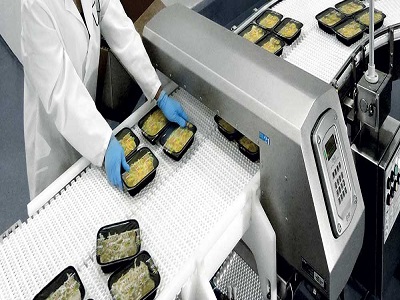
INDUSTRIAL METAL DETECTOR
Industrial metal detectors are specialized equipment used in various industries to detect the presence of metal contaminants in products or materials during manufacturing, processing, or packaging. These detectors play a critical role in quality control and ensuring product safety by identifying and removing metal contaminants that could pose hazards to consumers or damage equipment.
Here are some key features and considerations regarding industrial metal detectors:
1. **Detection Principle**: Industrial metal detectors typically use electromagnetic fields to detect metal contaminants within products or materials. When a metal object passes through the detector's electromagnetic field, it disrupts the field, causing the detector to trigger an alarm.
2. **Types of Metal Detectors**: There are several types of industrial metal detectors, including:
- **Conveyorized Metal Detectors**: These detectors are integrated into production lines and can continuously inspect products as they move along a conveyor belt.
- **Pipeline Metal Detectors**: Used in industries such as food processing and pharmaceuticals to detect metal contaminants in liquid or semi-solid products flowing through pipelines.
- **Gravity Feed Metal Detectors**: Designed for bulk materials such as grains, powders, or granules that flow through a gravity-fed chute.
- **Handheld Metal Detectors**: Used for manual inspection of products or materials in situations where conveyorized systems are not practical.
3. **Sensitivity and Detection Capabilities**: Industrial metal detectors vary in their sensitivity levels and detection capabilities, depending on factors such as the size and type of metal contaminants they are designed to detect. Some detectors can identify very small metal particles or non-ferrous metals (e.g., aluminum or stainless steel) in addition to ferrous metals (e.g., iron or steel).
4. **Integration with Production Processes**: Industrial metal detectors are often integrated into production lines or processing equipment to provide real-time monitoring and automatic rejection of contaminated products. They can be synchronized with other machinery, such as filling machines, packaging machines, or conveyors, to ensure efficient operation and minimize production downtime.
5. **Compliance and Standards**: Industrial metal detectors may need to comply with industry-specific regulations and standards, such as those set by food safety authorities (e.g., FDA, USDA), pharmaceutical regulatory agencies, or international standards organizations (e.g., ISO).
6. **User Interface and Controls**: Industrial metal detectors typically feature user-friendly interfaces and controls for setting sensitivity levels, adjusting detection parameters, and monitoring system performance. They may also include data logging and reporting capabilities for quality assurance and traceability purposes.
7. **Maintenance and Calibration**: Regular maintenance and calibration are essential to ensure the accuracy and reliability of industrial metal detectors. This may involve periodic inspections, cleaning, and calibration checks to maintain optimal performance.
Industrial metal detectors are indispensable tools for ensuring product quality, safety, and compliance in a wide range of industries, including food and beverage, pharmaceuticals, textiles, plastics, mining, and recycling. When selecting an industrial metal detector, it's essential to consider factors such as the type of products or materials being inspected, required sensitivity levels, production throughput, integration with existing equipment, and regulatory requirements.


